FIRST - Mapping flexibility of urban energy systems

FIRST - Mapping flexibility of urban energy systems

FIRST - Mapping flexibility of urban energy systems

With the publication of EPBD recast, it is expected many buildings to become nearly zero-energy (nZEB) by 2020. Since a nZEB refers to a high energy performance building of which annual primary energy consumption is covered to a very significant extent by energy from renewable sources, it is also expected that the buildings explore more the alternative energy supply systems available locally on a cost-efficiency basis. However, energy sources, such as wind and solar power, have an intrinsic variability that can affect the energy system stability.
The challenge regarding Net Zero-Energy Buildings (NZEBs) is related with the fact that the grid must be designed with respect to the power demand (typically electricity), as well as the local energy generation. Considering the prosumer’s role, the relationship between NZEBs and the supply grid is much more complex than a regular building. The performance of NZEBs can be analysed taking into consideration two related dynamic phenomena: the interplay between on-site generation and the building’s demand, often called Load Matching; and the resulting import/export interaction with the supply grid, commonly named Grid Interaction.
Various research, in the Smart Grid context, has been carried out, but not often on how Energy Flexibility (EF) can help stabilize the future energy system in buildings. For these reasons, we set out a research strategy to characterize buildings’ EF by analysing the strategies that will respond better to the need of stabilizing the future energy systems, in order to facilitate the penetration of renewable energy sources. The team will focus on studying the EF, based on:
The EF will be explored for residential and office buildings, based on simulations and on existing case studies. The EF potential will be assessed based on Load Matching, calculated at different time scales. The results obtained are expected to provide important insights regarding the technical solutions, occupant behaviour, and building control strategies, which might contribute significantly to the increase of the EF of NZEBs, on a cost-efficient basis.
FIRST relies on the experience of a multidisciplinary team of scientists (civil, electrical and mechanical engineers) from CTS, IN+ and LNEG.
NOVA.id.FCT
NOVA.id.FCT is a private non-profit research organization dedicated to Research and Development and Innovation (R&D+I) activities, in partnership with its Associates. It is responsible for the financial management of research projects, mainly in the area of engineering and sciences, financed by several public entities, like FCT, I.P. or the European Commission. This project is lead by NOVA.id.FCT.
CTS/UNINOVA
The Centre of Technology and Systems (CTS) aims to develop theoretical and applied research and encourages technology transfer mostly supported by spin offs and deep involvement in international R&D projects. CTS is part of UNINOVA Institute, a multidisciplinary, independent, and non-profit research institute, formed by the Faculty of S&T of the University Nova de Lisboa (FCT-UNL), to pursue excellence in scientific research, technical development, advanced training and technology transfer activities.
IN+/IST-ID
IN+ is a multidisciplinary research centre, linking basic and applied research to technology development, focusing issues of sustainability, namely in terms of the needs to secure the quality of the environment, together with the management of energy resources and economic development. IN+ is part of IST-ID (Association of Instituto Superior Técnico for R&D), a non-profit institution that primarily aims at carrying out S&T activities.
LNEG
The National Laboratory of Energy and Geology (LNEG) is a governmental research institution, with the mission to promote technological innovation in the frame of science and technology and the economic development in order to contribute to the growth of competitiveness of the economical agents in Portugal in a perspective of sustainable growth. LNEG assumes the role of interface between R&D and technology integration in the private sectors.
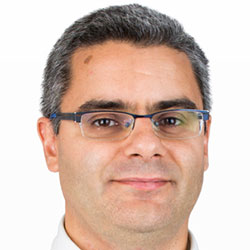
Assistant Professor at IST/UL

Researcher at IN+
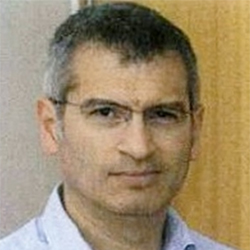
Assistant Professor at FCT/UNL
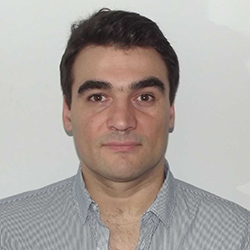
Researcher at IN+/IST-ID

Director of the Energy Laboratory and Vice-President of LNEG
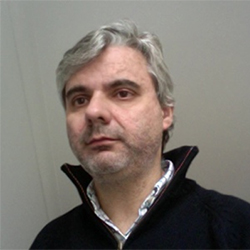
Associate Professor at FCT/UNL

Senior Researcher at LNEG
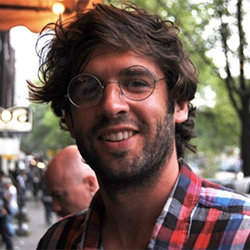
Assistant Professor at FCT/UNL

Researcher at LNEG
This workshop, held at MIT at the beginning of December 2019, joined the researchers from the FIRST project and researchers from MIT (Leo Glicksman, Christoph Reinhart, Jessica Transik and Audun Botterud) around the topic how to model sustainble cities)
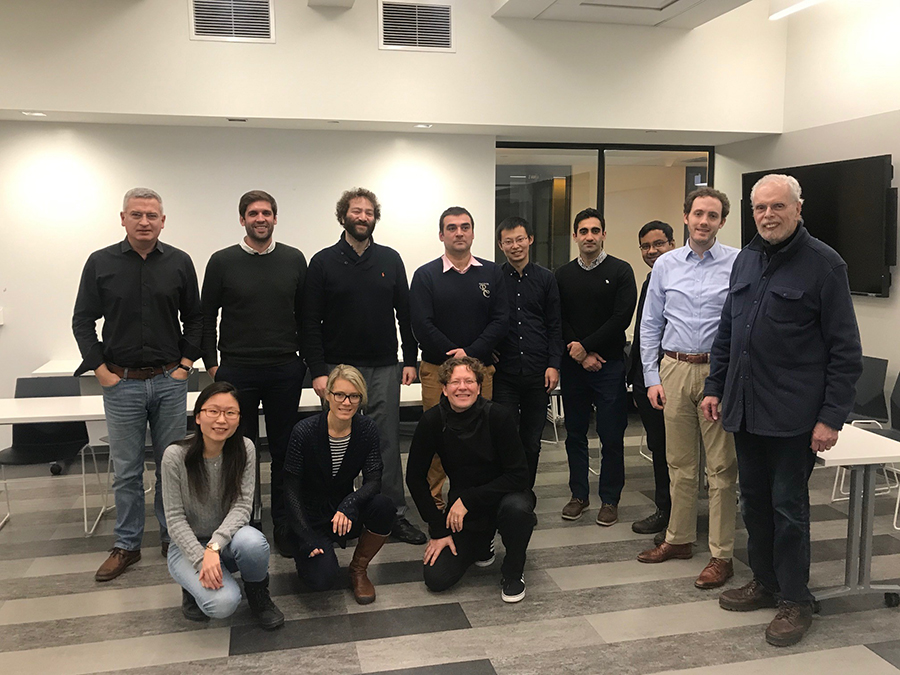
(workshop group photo)
The Final FIRST project, held in February 2020, joined the researchers from the FIRST project TEAM and researchers from UNOVA and IST from different fields (Environment, Mechanical, Civil and Electrical Enginering) to discuss the results of the project FIRST and discuss potential ideas for new research projects.
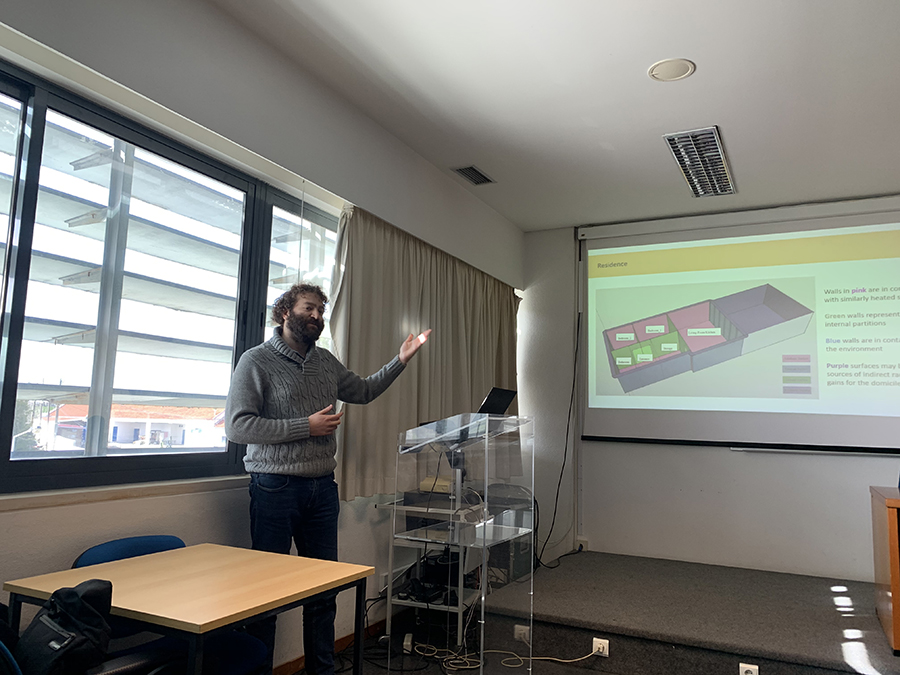
(PhD student Naim presenting the flexibility optimization algorithm)
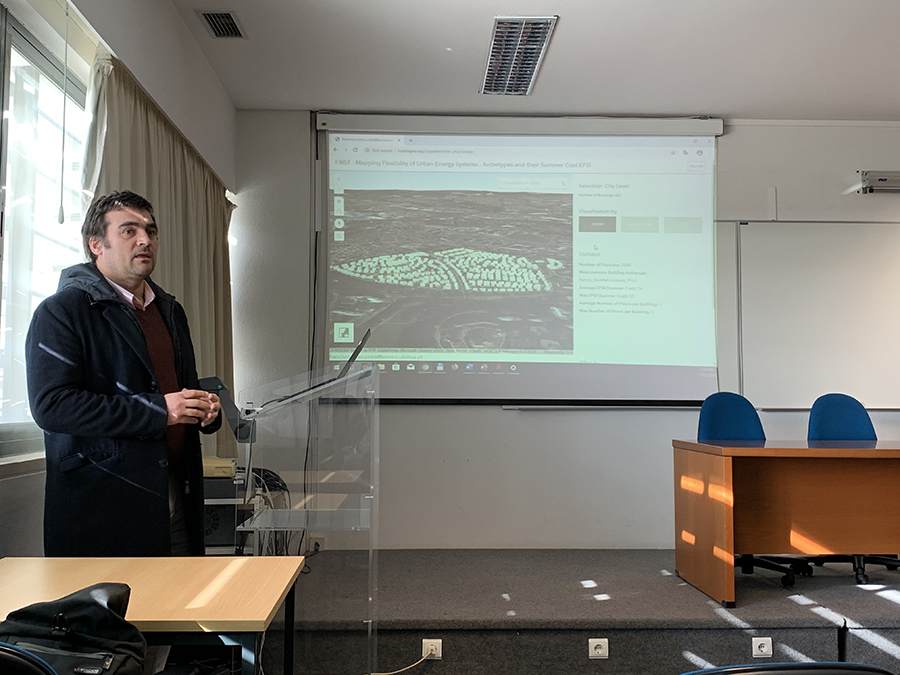
(PhD student Francisco Costa presenting the GIS mapping tool of flexibility)
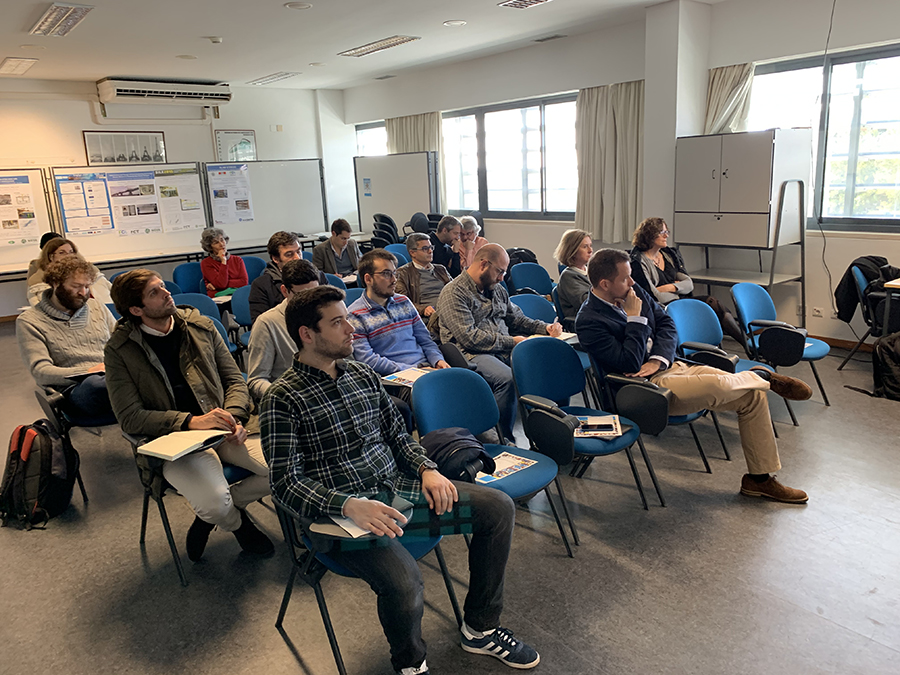
(workshop group photo)
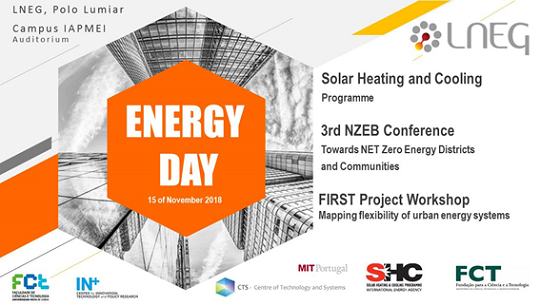
(http://www.lneg.pt/divulgacao/noticias-institucionais/625)
The FIRST project has its first workshop during the ENERGY DAY conference, organized by LNEG. The objective of this workshop is to discuss with academia, governmental agencies and industry the advantages of mapping urban energy systems and its features, in particular load flexibility. The ENERGY DAY is also hosting the 3rd NZEB Conference, this year focused on Zero Energy Districts and Communities and a Solar Heating and Cooling Workshop.
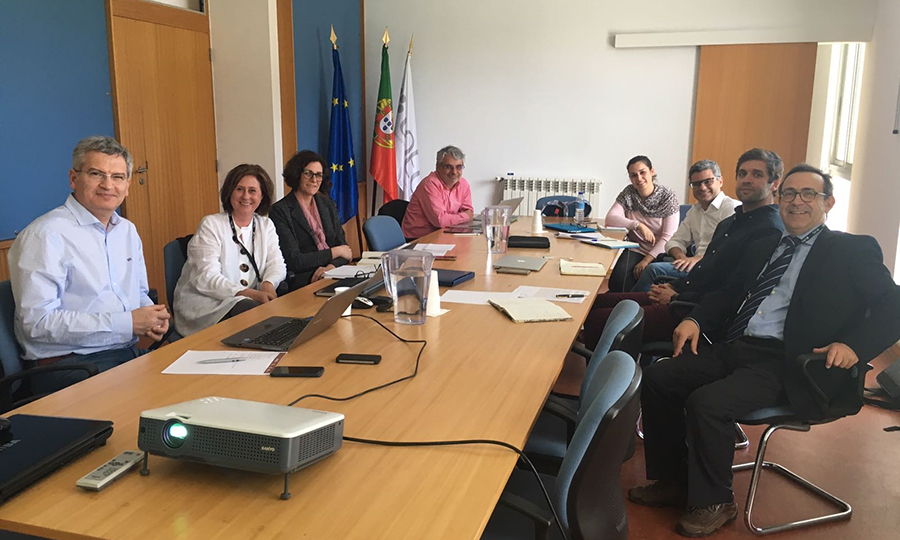
The Kick-off Meeting for FIRST, a project from IN+/Técnico and LNEG, took place on May 2018. The project aims to explore Energy Flexibility (EF) in residential and office buildings, assess its potential based on Load Matching calculated at different time-scales, to obtain important insights regarding technical solutions, occupant behaviour, and building control strategies that can contribute significantly to the increase of the EF of NZEBs, on a cost efficient-basis.
On Nov 15th, the first FIRST project WORKSHOP - “Mapping flexibility of urban energy systems towards NET Zero Energy Districts and Communities”. This workshop had several presentations regarding the role that flexibility plays to improve the energy performance of communities: first, Rui Amaral Lopes (FCT-UNL) provided the context with the presentation “Understanding Energy Flexibility”; Carlos Santos Silva (IST) presented the results of the SUSCITY project to frame the use of city energy modelling with the presentation “Urban data driven models for creative and resourceful urban transition”; Helder Gonçalves and Laura Aelenei (LNEG) presented then the “NZEB_LAB - Research Infrastructure on Integration of Solar Energy Systems in Buildings” as an infrastructure that supports the development of research projects like FIRST; Manuela Almeida (U. Minho) describe the new task of the IEA on “Cost-effective Building Renovation at District Level Combining Energy Efficiency & Renewables (IEA EBC Annex 75)” to explain the importance of designing policies at the community level; Ana Estanqueiro (LNEG) gave an overview of the current industrial trends on the presentation “Energy Flexibility - Industry Trends”. Finally, Daniel Aelenei, FCT-UNL presented the project initial results in the presentation “FIRST - Mapping flexibility of urban energy systems". The discussions during the workshop provided very interesting ideas for the research team to tackle during the development of the project.
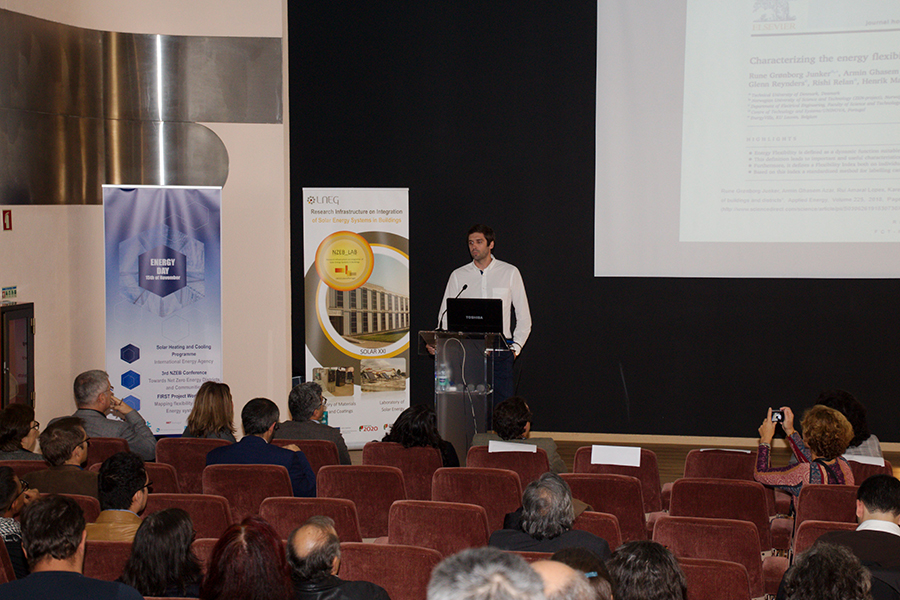
Rui Lopes introducing the concept of energy flexibility to the audience
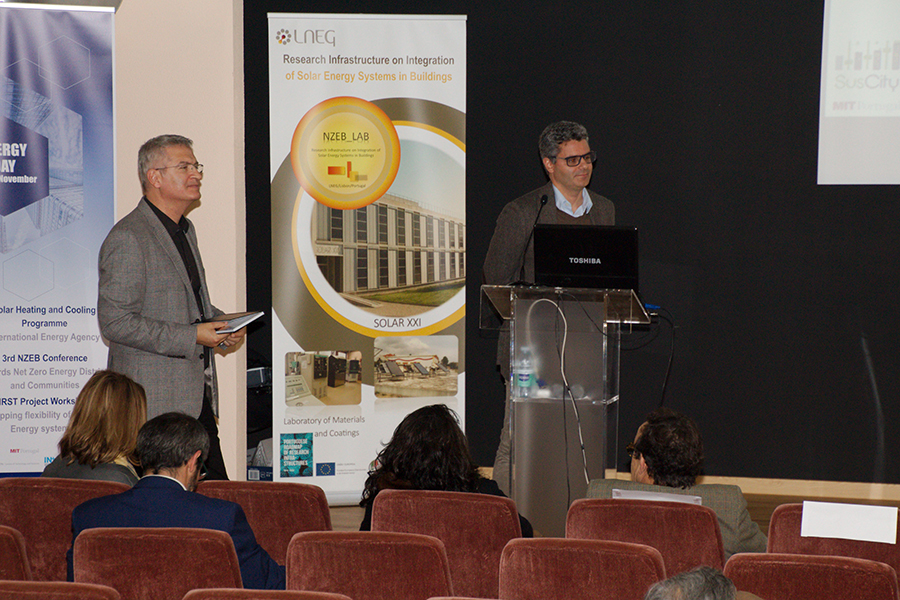
Daniel Aelenei and Carlos Santos Silva answering questions from the audience
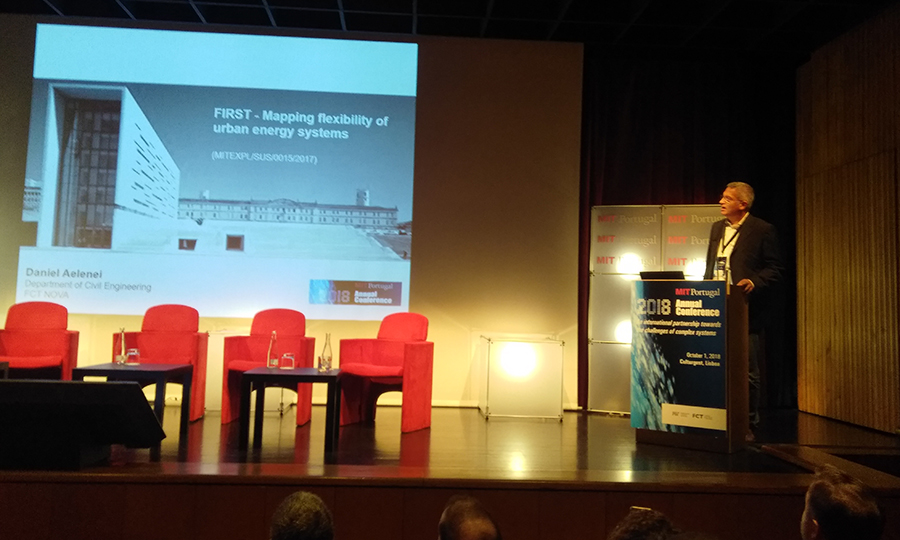
The FIRST Project was presented in the MIT Portugal Program Conference 2018 (https://www.mitportugal.org/events/conference-2018) by the PI, Daniel Aelenei. The FIRST project is currently the only exploratory project that deals directly with the urban sustainability challenge. As the project has officially started in September 2018, the presentation focused on the scope and objectives of the project.